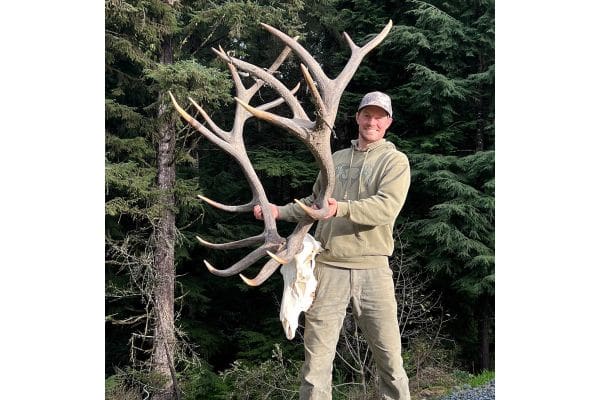New Potential World’s Record Roosevelt’s Elk Entered into Boone and Crockett Club Big Game Records

The records department of the Boone and Crockett Club recently received a Roosevelt’s elk entry, which, if confirmed by a judges panel, will be crowned the new world’s record.
The recent entry was killed by Timothy Carpenter on September 21, 2023, in Humboldt County, California. With a preliminary score of 439 7/8 points, Carpenter’s elk smashes the previous world’s record of 419 6/8 points taken by Rick Bailey in British Columbia in 2015. No stranger to big elk, Carpenter has multiple Roosevelt’s elk in the records, including a 2011 bull that scored 398 1/8, which is the current archery world’s record.
Carpenter, 39, splits his work between guiding elk hunters in the fall and working as a wildlife biologist in the spring. He rarely gets a day to hunt for himself, but he is able to get out in the field often. “It is very rewarding to be part of any successful Roosevelt’s elk hunt,” Carpenter says. “It is that much more rewarding when we are able to take animals that are mature—or even past their prime—and are Boone and Crockett animals.”
All that time spent guiding and working with wildlife lets him take advantage of the limited amount of time he has by learning the area, meeting the landowners, and keeping an eye on the animals. He estimates the bull was around 11 or 12 years old. Carpenter aged the meat for two weeks in a cooler, and those elk steaks have made many delicious meals, he says.
Roosevelt’s elk are one of three subspecies of North American elk for which the Boone and Crockett Club keeps records. Named after Club founder Theodore Roosevelt, Roosevelt’s elk are found exclusively in the Pacific Northwest, ranging from northern California up through British Columbia’s mainland and into Alaska.
They are the biggest elk subspecies, with bulls weighing as much as 1,100 pounds. You might assume Carpenter’s bull would have had a huge body because it sports a world’s record rack, but that wasn’t the case. “You’d think that packing antlers around like that, it would be beefier,” Carpenter says. “The elk’s body was the average size of a mature Roosevelt’s bull, and his antlers still dwarfed his body. It was probably from a combination of great genetics, perfect environmental conditions, and lots of late rain providing great forage for finishing out antler growth.”
Before Carpenter’s entry is official, Boone and Crockett Club procedures require that the final score of a potential world’s record be verified by either an Awards Program Judges Panel or a Special Judges Panel. Awards Program Judges Panels are assembled once every three years, with the next awards judging panel being held in April 2025. Special Judges Panels are convened during the interim between Awards Program Judges Panels with the sole purpose of verifying and declaring a new world’s record. In either case, two teams of two judges each measure the entry, and if the scores of both teams verify the original measurement, the panel will declare it a new record.
Founded by Theodore Roosevelt in 1887, the Boone and Crockett Club promotes guardianship and visionary management of big game and associated wildlife in North America. The Club maintains the highest standards of fair chase sportsmanship and habitat stewardship. Member accomplishments include enlarging and protecting Yellowstone and establishing Glacier and Denali national parks, founding the U.S. Forest Service, National Park Service and National Wildlife Refuge System, fostering the Pittman-Robertson and Lacey Acts, creating the Federal Duck Stamp program, and developing the cornerstones of modern game laws. The Boone and Crockett Club is headquartered in Missoula, Montana. Click here to learn more about the Boone and Crockett Club.
The post New Potential World’s Record Roosevelt’s Elk Entered into Boone and Crockett Club Big Game Records appeared first on HuntingLife.com.
